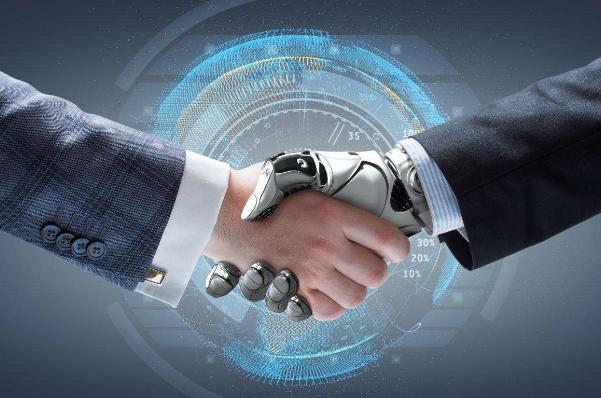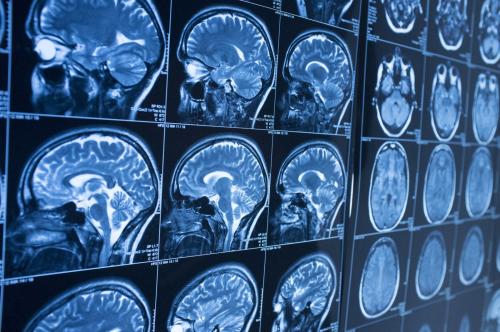


The grim future illustrated by The New Yorker magazine cover of a human beggar receiving bolts from robots passing by is increasingly feared among many, as AI-assisted machines are becoming more common, replacing everything from human labor, customer service, news writing, pornography detection, and CT image analysis.
The future may not be all that miserable, however.
AI will propel the knowledge economy further and it holds great potential for dealing with labor shortages amid the nation’s demographic challenges, including population aging and declining birth rates. Meanwhile, structural changes in employment can be addressed with improved education, according to a report analyzing AI’s impact on China’s job market.
The report “Human Capital Investment in the AI Era: Future Challenges and Coping Strategies in the Chinese Job Market” was jointly released on Wednesday in Beijing by the China Development Research Foundation (CDRF) and Sequoia China.
It reportedly marks the first-ever comprehensive policy research product released in China that focuses on the impact of AI on the Chinese job market.
The report found that robots are already replacing human labor in Jiangsu, Zhejiang and Guangdong provinces – all of which are leading regions in manufacturing industry. Some 12% percent of the surveyed companies in Hangzhou are deploying AI technology and some 5% of the urban population in Dongguan has been replaced by robots in factories.
A total of 96,000 jobs in retail jobs may be replaced, while some 23% of finance workers are expected to see their posts totally or partially replaced by AI. In the meantime, AI can be used to improve the efficiency of some 1.7 million jobs in the retail industry, and 77% of the workers in the finance industry can benefit from AI, too, the report noted.
On Tuesday, a new AI-assisted technology was unveiled at a cybersecurity conference hosted by the Internet Society of China and Alibaba, which can detect illegal content online, including pornography, antisocial violence, and spam messages, as well as telecommunication fraud – jobs that used to be carried out manually by human technicians.
Starting in 2018, Alipay alone has assisted 36,325 investigations, which have led to the arrest of 3,224 fraud suspects, after AI technology detected abnormal transactions through big data analysis.
“Scientific progress has always brought more opportunities than challenges. The new AI revolution is no exception. AI will bring more job opportunities, greater efficiency, and a more comfortable and convenient environment for life and business. In general, we don’t need to fear AI,” said Hao Jingfang, a researcher with CDRF and an author of the report.
The most popular skills in the future will be the capability to deal with new technologies, creativity, and the ability to build emotional bonds with people, Hao noted, concluding in the report that China should step up education and vocational training to meet the demands.

“China’s early childhood and preschool education system lags behind global standards, and China’s vocational education also needs further improvement. These shortcomings will hinder China’s labor market from transitioning to an AI-led future. Actions should be taken as soon as possible to address these potential challenges, including speeding up urbanization to release a city’s potential in innovation,” said Lu Mai, secretary general of CDRF.
AI should be applied first in sectors needing the most economic and social investments, such as education, healthcare, law, and finance and the educational resources of other mid to high-end service sectors should be allocated to further fairness and equality and foster a new generation in the workforce that can easily adapt to social changes. Lifelong learning and high-quality vocational training systems should also be established, and the social security system should play a stronger role in providing a safety net and redistributing wealth, according to Neil Shen Nanpeng, founder and managing partner of Sequoia China.
Lu Xin, a former vice minister of the Ministry of Education, agreed that a lifelong learning system should be set up and promoted with well-established training institutes. She predicted that AI would become part of China’s fundamental courses, such as Chinese, English, and math, to provide a sound foundation for future talent training.
China will also continue developing the smart economy and promoting the AI and high-end manufacturing industry, according to Zhang Yizhen, vice minister of the Ministry of Human Resources and Social Security.
“Artificial intelligence and human intelligence can reinforce each other and develop hand in hand,” Shen said. “AI will greatly free humans from repetitive jobs and cultivate creative minds.”

 Fire brigade in Shanghai holds group wedding
Fire brigade in Shanghai holds group wedding Tourists enjoy ice sculptures in Datan Town, north China
Tourists enjoy ice sculptures in Datan Town, north China Sunset scenery of Dayan Pagoda in Xi'an
Sunset scenery of Dayan Pagoda in Xi'an Tourists have fun at scenic spot in Nanlong Town, NW China
Tourists have fun at scenic spot in Nanlong Town, NW China Harbin attracts tourists by making best use of ice in winter
Harbin attracts tourists by making best use of ice in winter In pics: FIS Alpine Ski Women's World Cup Slalom
In pics: FIS Alpine Ski Women's World Cup Slalom Black-necked cranes rest at reservoir in Lhunzhub County, Lhasa
Black-necked cranes rest at reservoir in Lhunzhub County, Lhasa China's FAST telescope will be available to foreign scientists in April
China's FAST telescope will be available to foreign scientists in April "She power" plays indispensable role in poverty alleviation
"She power" plays indispensable role in poverty alleviation Top 10 world news events of People's Daily in 2020
Top 10 world news events of People's Daily in 2020 Top 10 China news events of People's Daily in 2020
Top 10 China news events of People's Daily in 2020 Top 10 media buzzwords of 2020
Top 10 media buzzwords of 2020 Year-ender:10 major tourism stories of 2020
Year-ender:10 major tourism stories of 2020 No interference in Venezuelan issues
No interference in Venezuelan issues
 Biz prepares for trade spat
Biz prepares for trade spat
 Broadcasting Continent
Broadcasting Continent Australia wins Chinese CEOs as US loses
Australia wins Chinese CEOs as US loses